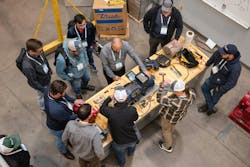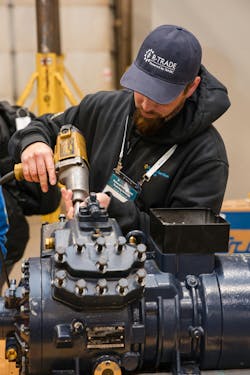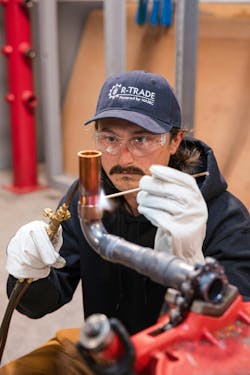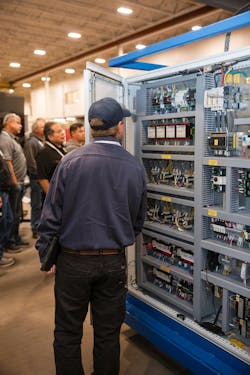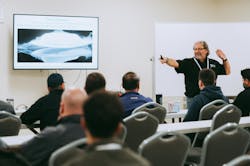Investing in Technician Training and Recruitment: A Smart Business Decision for the Refrigeration Industry
Key Highlights
- The industry currently has around 80,000 unfilled HVACR jobs, impacting service delivery and delaying the transition to natural refrigerants.
- Training programs like R-TRADE and the Natural Refrigerant Training Summit provide free, hands-on education to over 1,600 technicians since 2023, preparing them for advanced refrigeration systems.
- Collaborative efforts supported by major companies and OEMs foster a unified approach to workforce development, benefiting the entire industry ecosystem.
Constant regulatory changes are driving the refrigeration industry toward a transition from hydrofluorocarbon (HFC) refrigerants, pushing companies to adopt climate-friendly alternatives like natural refrigerants. But while the technology may be ready, the workforce isn’t — at least not yet.
The industry faces a growing and persistent shortage of qualified refrigeration technicians, making it a legitimate business problem. But it’s more than just a need to fill jobs. It’s a need for long-term solutions that ensure business continuity, meet compliance goals, and future-proof the industry. That’s why strategic investments in technician training and recruitment are more than altruistic; they’re essential for the bottom line.
The Business Cost of a Technician Shortage
The impact of the technician shortage is already being felt. According to a 2021 Copeland publication, around 80,000 HVACR jobs are currently unfilled, representing 39% of the workforce. The U.S. Bureau of Labor Statistics estimates 40,100 HVACR job openings annually between 2021 and 2031.
These vacancies strain service contractors, increase downtime for essential refrigeration systems, and create a bottleneck for the HFC transition. Without enough trained technicians, businesses risk project delays, missed service calls, and loss of customer trust.
Worse, the shortage is cyclical. Fewer technicians mean longer hours and higher stress for those still in the field, leading to burnout and even more attrition. This negative feedback loop threatens the stability of the entire industry.
Technician Training is Good for Business
Training programs offer a direct and immediate solution. Properly trained technicians deliver better service, improve system performance, and ensure regulatory compliance, all of which drive down operational costs and support long-term business goals.
The North American Sustainable Refrigeration Council (NASRC) launched R-TRADE (Refrigeration Technician Recruitment, Advancement, Development, and Education) in response to this urgent need. This program goes beyond tackling the shortage; it’s building a skilled workforce to carry the industry into the future.
Real Impact: Training That Works
The Natural Refrigerant Training Summit series is one of the program’s standout components. These free, multi-day events are held nationwide and feature hands-on training from multiple vendors and industry trainers on the latest natural refrigerant technologies. Service contractors, training providers, unions, and other industry partners overwhelmingly support the series.
Since launching in 2023, the Training Summits have provided free training to over 1,600 technicians, and the reach continues to grow. Between fall 2024 and spring 2025 alone, more than 800 technicians received over 10,000 hours of training, equipping them with the skills to work on advanced systems that many businesses are actively deploying. The next Training Summit will be held Dec. 4 in Stockton, California.
Natural Refrigerant Training Summit 2025 – 2026 Season
December 4 – 5, 2025 | Stockton, CA
February 10 – 12, 2026 | Poughkeepsie, NY
March 10 – 12, 2026 | St. Louis, MO
April 21 – 23, 2026 | Irwindale, CA
Learn more and register at nasrc.org/training.
Recruiting the Next Generation of Technicians
Recognizing that today’s students are tomorrow’s workforce, the events also feature HVACR student career fairs, creating a rare opportunity for students to interact with industry leaders and recruiters. So far, these events have welcomed nearly 600 students and faculty from roughly 70 schools to build connections, gain insight, and explore careers in refrigeration.
Student and employer feedback has been overwhelmingly positive, with students reporting significant increases in their interest in a career in commercial refrigeration. For example, at a Pittsburgh event in March 2025, students’ self-reported likelihood of entering a career in commercial refrigeration increased by 21% after the event. We’ve heard from several employers that they have hired students after meeting them at these events, and we plan to continue tracking employment over the coming months. These results are practical, immediate, and business-focused.
Building Long-Term Capacity
Part of R-TRADE’s focus is to ensure the workforce grows today and thrives for years to come. The Training Summit career fairs have also established relationships with school faculty, positioning us to support their programs. Last summer, the Train the Trainer pilot program equipped trade school faculty in Southern California with the knowledge and tools to teach supermarket refrigeration and natural refrigerants, topics historically absent from many HVACR curricula.
Participants reported significant gains in their understanding of CO2 systems and supermarket refrigeration, and several schools have already begun expanding their programs. This pilot provided a proven and replicable model that we hope to scale nationwide as the Training Summit series expands to new locations.
Strengthening the educational pipeline for refrigeration technicians is a key solution to ensure businesses have continuous access to a pipeline of qualified, knowledgeable candidates, reducing hiring costs and ensuring higher first-time fix rates on service calls.
Collaboration is Key
One of the most remarkable aspects of R-TRADE is the level of collaboration it has inspired. It creates a neutral territory where competition across companies is set aside to contribute to a shared goal: building a robust, sustainable workforce. R-TRADE is supported by seed funding from Albertsons, Amazon, Costco, Kroger, and Walmart, but the program stakeholders are far-reaching. OEMs have donated equipment and training resources, service contractors have shared challenges and expertise, and schools have opened doors to new curricula.
In 2025, after numerous requests from companies to help, NASRC launched the R-TRADE Supporters program, which allows organizations to directly invest in workforce development solutions.
This collaborative approach isn’t just good for public relations — it’s good for business. A skilled and stable workforce benefits everyone, reducing strain on contractors, mitigating risks for facility owners, and ensuring safety and compliance for end-users.
The Path Forward
Technician training and recruitment will become increasingly critical as the industry transitions from HFC refrigerants. Skilled labor is the backbone of service reliability, energy efficiency, and emissions compliance.
Businesses that engage in and support technician training today are setting themselves up for long-term success and positioning themselves as leaders. They’ll be better equipped to adapt to evolving technologies, meet regulatory standards, and maintain a competitive edge in a rapidly changing market.
The message is clear: technician training and recruitment are strategic investments that will shape the future of the refrigeration industry.
R-TRADE provides necessary solutions that benefit every sector of the refrigeration industry. By fostering a skilled technician workforce, this program meets the refrigeration industry’s immediate needs while equipping technicians to enable a smooth transition from HFCs that will pave the way for a sustainable and resilient sector. For more information about the many solutions the program offers, visit rtrade.org.
About the Author
Morgan Vanzo
Morgan Vanzo is the senior director of the North American Sustainable Refrigeration Council (NASRC), a 501(c)(3) nonprofit organization that partners with the refrigeration industry to advance natural refrigerants and reduce greenhouse gas emissions caused by traditional HFC refrigerants.
